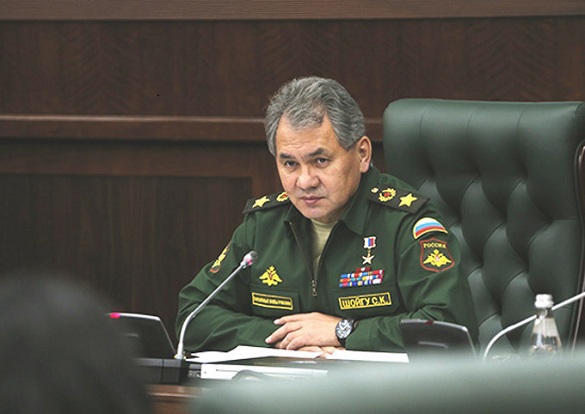Russian armed forces returning to Latin America
Vladimir Putin said that he would not allow the West to achieve military superiority over Russia. Russia will continue strengthening the nuclear potential, develop space forces, navy and long-range aviation. The Russian Navy plans to commission two new nuclear submarines. However, Russia lacks a developed system of bases that had been lost after the collapse of the USSR. Russian Defense Minister Sergei Shoigu tried to fill the gap during his tour of Latin America on February 11-14.

Defense Minister Sergei Shoigu in Latin America
Of course, the minister discussed issues of closer cooperation in other military areas, such as arms supplies, personnel training and conducting joint drills to repel possible aggression. Noteworthy, Venezuela, Nicaragua and Cuba are members of the leftist bloc ALBA that considers US imperialism the main threat to overthrow legitimate governments in their countries in order to establish pro-American regimes there.
The results of the visit have not been disclosed. It is possible, though, that Defense Minister Shoigu was sounding out opportunities for Vladimir Putin's possible visits to the above-mentioned countries to sign adequate agreements. In Nicaragua, an intergovernmental agreement was signed to establish a simplified procedure for vessels of the Russian navy to enter Nicaraguan ports. Another agreement was signed to train military specialists at Russian universities. Venezuela offered its "friendly ports" to Russian ships as well. The country is willing to organize joint drills with Russia, including with the use of multiple rocket launchers. It is possible that aircraft of the Russian Air Force may land in the country someday soon as well.
During the meeting with Cuban leader Raul Castro in Havana, Russian Defense Minister Shoigu said that "military relations develop constructively." Shoigu expressed Russia's gratitude to the Cuban side for the honors given to Russian military ships and vessels during their call at the port of Havana. It goes about The Victor Leonov electronic intelligence ship that paid a visit to Cuba in January 2015 and a couple of times in 2014.
Russia and Cuba agreed to train Cuban specialists in Russia. This is a very important aspect, as it means the technical and mental attachment of the armed forces of Cuba, Nicaragua and Venezuela to Russia. This marks a return to the Soviet system of allied military cooperation between Russia and Latin America.
This long-term strategy imposes obligations on Russia to supply its allies in Latin America with advanced weapons, including air defense systems, aircraft and warships. Such issues were discussed in Nicaragua, Pravda.Ru wrote with reference to defensa.com website. "Moscow will begin shipping patrol gunboats in Managua during the second half of 2016 as part of the package that Russia offered Nicaragua last year."
Furthermore, if we sell or have plans to sell S-300 and S-400 systems to Beijing and Tehran, why not selling them to Managua, Caracas and Havana? Brazil has recently acquired mobile anti-aircraft Pantsir S-1 (NATO reporting name SA-22 Greyhound) systems, as well as Igla MANPADs totaling 955 million dollars.
The contract for the purchase of Pantsir S1 is to be signed in July 2015, according to the Ministry of Defence of Brazil. The systems will serve to defend the presidential palace, strategic factories, such as Embraer factory of aerospace and defense equipment, a submarine base and Itaguaí Naval Shipyard, where Brazil is building its first-ever nuclear submarine.
Russian forces returning to Latin America
On January 30, Army General Valery Gerasimov said in Moscow that Russia was planning to hold first talks with military authorities of Brazil, Vietnam, Cuba and the Democratic People's Republic of Korea to hold "a number of joint naval and air exercises."
Brazil is very important for Russia in terms of strategic partnership within the framework of the BRICS organization. Russia is unable to resist the United States in Latin America, but it can do something if the country works within the limits of this bloc.
Alberto López Girondo, a political analyst and columnist at Revista Accion from Argentina, told Pravda.Ru that Russia should cooperate with the countries of Latin America, "to strengthen strong ties between Russia, the countries of Latin America and the BRICS countries in search of new geo-political scenarios."
The expert, however, does not find it expedient to resume the work of the Cuban base in Lourdes. During the Soviet times, the Cuban base was used as a base of electronic intelligence in light of the talks between Havana and Washington. According to the expert, now is not the time when this can happen, as it is more important for Cuba to get rid of the trade embargo.
Lopez Girondo does not think that one can be optimistic about strengthening Russia's influence in Latin America.
"I think it goes about a trend of increasing Russia's influence in the region, but the trend is unfavorable for the United States, - Vladimir Yevseyev, Director of the Center for Public Policy Research told Pravda.Ru. - Latin America is waiting, when Russia comes to the region. Russia is developing relations not only with Brazil, a member of the BRICS, but also with Argentina. Russia works to create an alternative to the US. This is very important for many countries, because if there is an alternative, they feel more confident in the international arena.
"Through the territory of Nicaragua, it is planned to build a new canal parallel to Panama Canal. In this case, vessels of the Russian fleet will be able to enter the Gulf of Mexico, that is exit the Pacific Ocean to enter the Atlantic. This is highly important, because in this case, Russia will be able to ensure so-called nuclear deterrence, because the Russian navy has long-range cruise missiles. If such Russian vessels are deployed somewhere near the territory of Cuba, they will be able to attack the United States. This is our response to the deployment of US military objects near the Russian border. If the United States continues to behave the same way, probably, Russia will make further steps to resume the work of the military facility in Lourdes," Vladimir Yevseyev told Pravda.Ru.
"The United States is quite vulnerable. One may eventually have to create missile defense from the side of Florida, rather than Alaska. All these issues arise and require huge financial resources. I think it will convince the United States of the short-sightedness of this kind of policy. The Americans thoughts that Cuba would fall into their arms, but the Cubans asked the Americans to withdraw the Guantanamo military base first," the expert told Pravda.Ru.
Lyuba Lulko
Subscribe to Pravda.Ru Telegram channel, Facebook, RSS!


